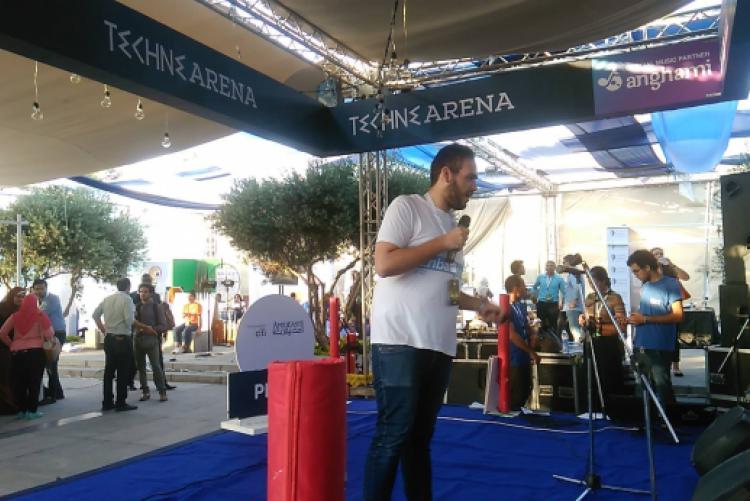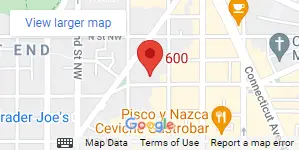After several years of working as an academic adviser, Ahmed El Gebaly knew firsthand that Egyptian youth are keenly interested in scholarship opportunities. Abdo Sami, an engineer “who loves being an entrepreneur,” had reached the same conclusion, when he, Ahmed, and Sami Al-Ahmed, their third partner, teamed up to launch Marj3, an online platform to provide youth across the MENA region with information and guidance about scholarships.
Their timing couldn’t have been better. Soon after launching Marj3 in July 2016, they heard of the Youth Entrepreneurship Program (YEP), an initiative that Amideast launched in partnership with Citi Foundation to help aspiring young Egyptian entrepreneurs succeed beyond the critical early stages of founding a business.
“YEP could be a success story for a lot of youth who are starting from scratch. You can start your idea and work on it until it becomes a startup, and it could even exceed this.” — Ahmed El Gebaly, Marj3 Cofounder
Since joining YEP, the team has seen Marj3 take off. Within four months, traffic to the startup’s website grew tenfold, and it now averages some 250,000 users monthly. The audience they reach is wide-ranging, with 55 percent of Web visitors residing outside Egypt.
Adds Ahmed, YEP taught “us how to be leaders in our project and how to manage our teams,” lessons that were reinforced toward YEP’s end through the program’s emphasis on “paying it forward” — when “we started delivering the training ourselves,” as Ahmed put it — so that other youth could benefit from an awareness of entrepreneurship.
“YEP could be a success story for a lot of youth who are starting from scratch,” Ahmed offers. “You can start your idea and work on it until it becomes a startup, and it could even exceed this.”
A Supportive Program
Ahmed’s can-do attitude is typical of the 43 aspiring entrepreneurs who completed YEP, with 16 businesses and an impressive collection of awards among them. Sahar Salama, Amideast/Egypt’s manager of exchange programs, notes, “They are all optimistic, and energetic. They have all these ideas, and all these dreams that they would like to achieve.”
Many of YEP’s entrepreneurs are on the road to success because of the training, coaching, and mentoring they received during the 20-month program. By September 2018, nine teams were ready to pitch their ventures at the Techne Summit, an annual international technology entrepreneurship event in Alexandria, Egypt, that this year attracted more than 4,000 professionals from different backgrounds and businesses.
Many have also won competitions and other recognition.
Take Mazboot, for example. The startup, which created the first mobile application to help Arab diabetic patients manage their disease, saw substantial growth as a direct result of YEP support. Although the app addresses a serious and growing health problem in the Arab world, its team’s great ideas, as seasoned entrepreneurs would caution, were no guarantee of success.
Mazboot cofounders Ahmed Medhat and Tarek Mandour report that their productivity increased significantly after YEP gave them access to shared space, allowing their entire team to gather in one place for the first time. The initial training workshops and incubation period were also critical, helping them recognize that they needed to add a diabetes coach and expand their target market to include insurance companies as well as doctors and patients.
“We’re at the beginning of the road,” says Ahmed, “but we see our dream at the end: that Mazboot will be the official app for diabetics all over the Arab world.”
Empowering Youth through Entrepreneurship
YEP is part of Citi Foundation's global Pathways to Progress approach to prepare urban youth to thrive in today's economy. Programs that make up this approach are focused on developing economic opportunities for youth through activities such as entrepreneurship education, engagement in the formal economy through first jobs, and acquisition of leadership, financial, and workplace skills.
The effects of Amideast’s pay-it-forward model are far-reaching. YEP’s initial goal was to impact 600 other young people, but the program’s startup teams have already trained 1,500 individuals.
Citi Egypt’s CEO Nadir Shaikh says, “This is a program that we really want to carry forward and see how far it can be stretched into the next two or three years to impact as many youth as possible.”
Shahinaz Ahmed, Amideast’s country director for Egypt, is confident that Amideast’s partnership with Citi can make a huge difference. Noting that interest in starting a business is strong among Egypt’s large youth demographic, she asserts. “There are so many examples of Egyptian youth facing incredible odds who, with a little bit of help, have been able to overcome them.”
YEP is proud of the startup teams it worked with. In addition to Marj3 and Mazboot, they include Aklena 3ala Sat7ena, Bookabikia, Delta Oil, El Balakona, Elegate, Enbarter, Es3af, FlareInn, IBUS, Ispark, Jidar, Korsatk, Mobilia Plus, and Patronelle.
Keep an eye on these energetic, bright young entrepreneurs. They’re eager to succeed, and we’re certain that they will!


